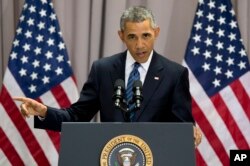The White House says it is "disappointed" but not "surprised" that one of the top Democrats in the U.S. Senate came out against the pending nuclear deal with Iran.
Spokesman Josh Earnest said Friday the senator, Chuck Schumer, has had a difference of opinion with President Barack Obama going back to 2003, referring to Schumer's vote and support for the U.S.-led war in Iraq.
"That's why I would describe this as an announcement that was not particularly surprising to anybody here at the White House, even if it was disappointing," Earnest said. "But it does not change our confidence that we will be able to mobilize [a] substantial majority of Democrats in both the House and the Senate in support of the deal and, if necessary, to sustain the president's veto."
In a statement explaining his concerns, Schumer said the inspections regime was inadequate. He also expressed concern the money freed up by the sanctions relief will allow Iran to increase its funding for militant groups across the Middle East, further destabilizing the region.
The decision by Schumer, who is expected to take over as Democratic leader in the Senate in 2017, was seen as a serious setback for the Obama administration, which is struggling to gain congressional backing for the Iran nuclear deal. On Thursday, one of the top Democrats in the House of Representatives, Eliot Engel, also announced his opposition to the pact.
Russia visit
Meanwhile, the United States said it is "very concerned" about Western media reports that the commander of Iran's elite Quds Force in recently visited Russia in violation of a U.N. travel ban.
The U.S. ambassador to the United Nations, Samantha Power, on Friday said officials are seeking details about the reported trip.
"Qassem Soleimani is subject to a United Nations travel ban, and this travel ban requires all states to prohibit Qassem Soleimani from traveling to their nation," Power said. "The only exception to that is if the Iran Sanctions Committee grants an exemption. And to our knowledge no exemption was granted, and we should know."
Fox News and the Reuters news service both reported that Soleimani arrived in Moscow on July 24 for meetings with Russian President Vladimir Putin and Defense Minister Sergei Shoigu.
Soleimani has been the subject of an international travel ban and asset freeze by the U.N. Security Council for nearly a decade.
The Iran nuclear agreement, reached last month between Iran and six world powers, will lift sanctions in exchange for Tehran scaling back its atomic program and allowing intrusive inspections at the facilities.
Israeli Prime Minister Benjamin Netanyahu and several powerful pro-Israel lobby groups have been putting intense pressure on U.S. lawmakers to reject the deal, saying it will undermine the security of Israel and the West.
The likelihood has been increasing that U.S. lawmakers will pass a bill rejecting the deal when they return from recess in September. Obama has said he will veto that decision, but needs the support of his fellow Democrats to sustain the veto.
Republicans hold the majority in both the Senate and House, and each house of Congress would need a two-thirds majority vote to overcome a veto.
Congress returns from its break in September and must vote on the nuclear agreement by September 17.






